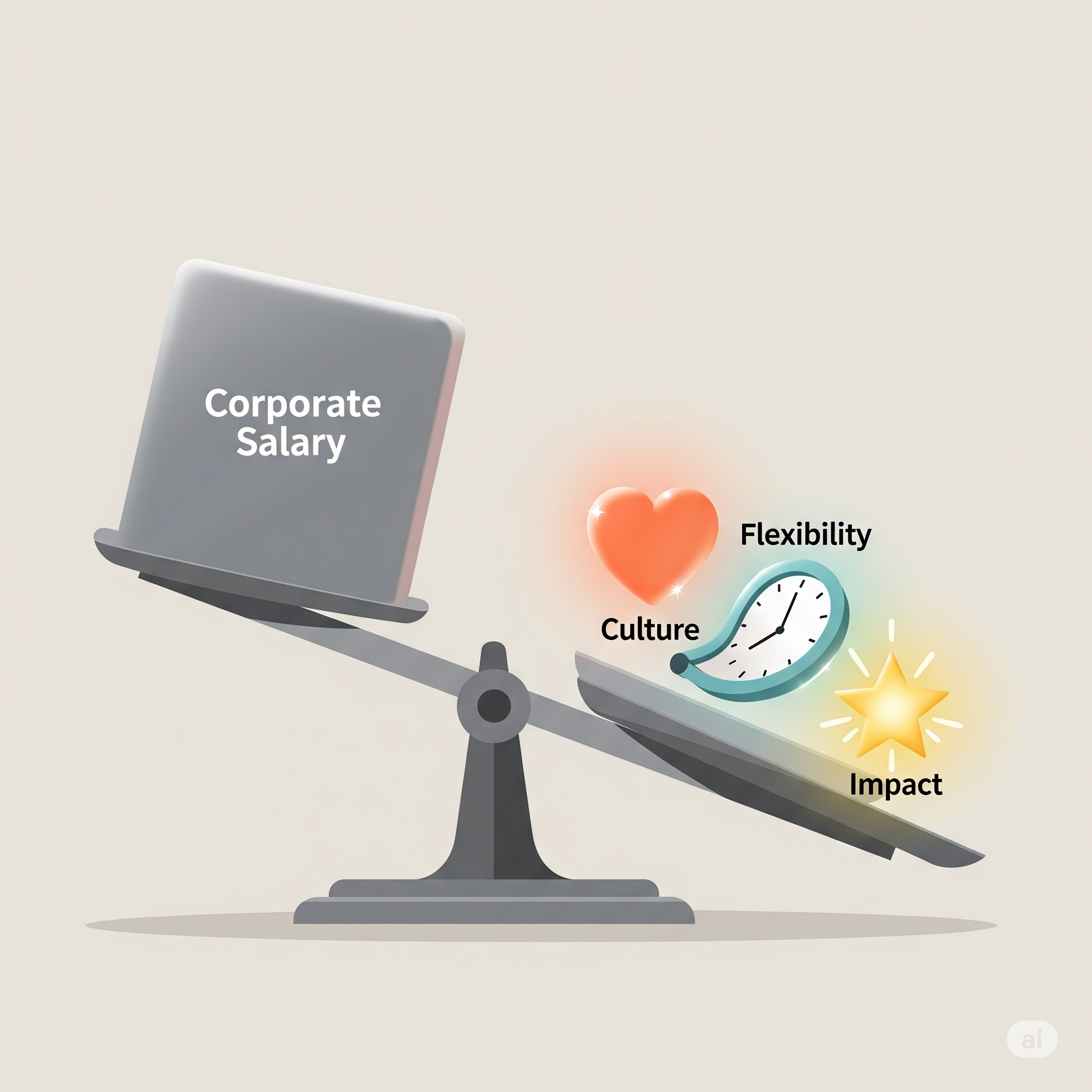Imagine this: You’re in a meeting, or maybe just talking with your coworkers by the coffee machine. Someone says something, or you see something happening, and a little alarm bell goes off in your head. It’s a feeling deep down in your gut that says, “Wait a minute. This isn’t right.” Maybe it’s something unfair, maybe it’s not completely honest, or maybe it just feels… off. You look around, and it seems like everyone else is going along with it, or maybe they noticed too but are staying quiet. In that moment, you feel a push and pull inside you. One part of you knows you should say something, that you should do something. But another part feels a cold wave of fear wash over you. What will happen if you speak up? Will you get in trouble? Will people be angry? Will you look foolish? Will you be left standing all by yourself, outside the group?
That moment, that heavy feeling of deciding what to do when your inner voice says one thing and your fear screams another, is one of the hardest parts of being a person. And it’s especially tough when you’re in a position where people look to you, like when you’re a leader. It’s in these quiet, sometimes lonely, moments that we really see what we’re made of. It’s about choosing the path that feels right in your heart, even when that path looks steep and difficult, and you can’t see anyone else walking it with you.
These times, when you have to decide if you have the courage to stand up for what you believe is right, even when it feels like you’re the only one doing it, are incredibly important. They don’t just show what kind of person you are; they also help create the kind of place you work in, the kind of team you’re on, and the kind of company you’re a part of. These choices are like building blocks for keeping things honest and fair. They help build trust among people and make sure the company acts in a way that everyone can feel good about later on.
I remember a situation from pretty early in my career that taught me a lot about this. I was part of a team working on a big project, and we were moving super fast. The pressure was on to finish everything quickly and without spending too much money. Everyone was focused, working long hours, and there was a real buzz in the air about getting this done. It felt exciting, like we were all in it together, pushing towards a finish line.
But as we got further into the project, I started to notice something that just didn’t sit right with me. It was about how we were talking about what our product could do when we were showing it to a potential customer. The customer was really interested, and we really, really wanted to get this deal. The problem was, it felt like we were making promises about the product’s abilities that weren’t quite true. We were talking about features that weren’t actually ready yet, or making it sound like the product could do things automatically that actually required a lot of manual work behind the scenes. It wasn’t like we were telling a complete made-up story, but it felt like we were stretching the truth so much that it was almost see-through, like thin glass.
My immediate thought, that little alarm bell, was loud and clear: “This isn’t right.” My stomach tightened. I knew, deep down, that this wasn’t honest. But then I looked around the room. Everyone else on the team seemed totally focused on getting this deal done. They were talking about how important this customer was, how much this project meant for our goals for the year, how the company really, really needed this success right now. The leader of the project, someone I looked up to and respected, seemed perfectly fine with how things were being presented. The energy in the room was all about closing the deal, about winning, about moving forward at full speed.
My heart started to race a little faster. My palms felt a bit sweaty. It felt like I was standing on the very edge of a high cliff, looking down. If I said something, what would happen? Would people think I was being difficult or trying to mess things up? Would I be told that I just didn’t understand how things worked, or that I was being too sensitive? Would I mess up this important deal that everyone wanted so badly? Would my colleagues be annoyed with me for stopping the momentum, for causing problems? The fear of being the only one who saw it this way, of being seen as the problem instead of a team player, was a really strong, heavy feeling. It felt much, much easier to just stay quiet, to go along with what everyone else was doing, to tell myself that maybe I was just overthinking it, that maybe in the big picture, this small bending of the truth wasn’t that big of a deal. Maybe it was just how business was done sometimes.
But that feeling in my gut, that clear voice that said “this isn’t right,” wouldn’t go away. It was persistent, like a little drum beating inside me, cutting through the loud noise of my fear and the pressure of the moment. I started to think about what would happen later if we got the deal based on promises the product couldn’t keep. What would happen when the customer actually started using the product and found out it didn’t do what we said it could? What would that do to our company’s reputation? Would they trust us again? What would it say about us, the team, if we were willing to stretch the truth just to make a sale? Would we feel good about our work?
It was a moment that seemed to stretch out forever, even though in real time, it was probably only a few seconds of silence while my mind raced. I pictured all the possible bad things that could happen if I spoke up – the awkwardness, the anger, maybe even being told I wasn’t a good fit for the team. But then I pictured the bad things that would happen if I didn’t speak up – the heavy, sinking feeling of having gone against my own sense of right and wrong, the potential damage to the trust we were building with this new customer, the silent message it would send to everyone on the team about what kind of behavior was okay.
Gathering every bit of courage I could find, taking a deep breath, my voice shaking just a little, I finally spoke. I didn’t yell or point fingers or make a big dramatic statement. I simply said, as calmly as I could, something like, “Excuse me, but I’m a bit concerned about how we’re presenting this particular feature. I understand how excited we all are about this deal, and how important it is, but I worry that we might be overpromising what the product can actually do right now. I think that could really hurt our relationship with the customer down the road if they feel like we weren’t completely upfront.”
The room went quiet. Everyone stopped talking and looked at me. For a moment, I felt completely exposed, like I was standing alone on a stage with a spotlight on me and everyone was watching. The project leader looked surprised, and maybe a little annoyed that I had interrupted the flow. Some of my colleagues looked uncomfortable, shifting in their seats, probably wishing I hadn’t said anything. It was exactly the kind of difficult, awkward moment my fear had warned me about. It felt like I was standing completely alone.
But then, something shifted. The project leader, after a moment of quiet thinking, slowly nodded. Their expression softened a little. “Okay,” they said. “Let’s talk about that. Are we completely confident we can deliver on everything we’re saying right now, or are we talking about future plans?” This opened a door. A few other team members, who had been quiet before, started to speak up too, voicing similar concerns, though maybe in a less direct way than I had. The conversation in the room started to change. It wasn’t just about closing the deal anymore; it was about making sure we were being honest and setting the right expectations with the customer.
It wasn’t a dramatic scene like you see in movies, where everyone suddenly cheers for the brave person. The conversation was still a bit difficult, and we had to work harder to find a way to talk about the product that was both exciting for the customer and completely, 100% truthful about what it could do right now. We ended up adjusting the proposal slightly and being more upfront about the current limits of that feature and our plans for making it better in the future. We still got the deal, and the customer actually seemed to appreciate our honesty later on, which helped build a stronger relationship.
That experience taught me so much about the real meaning of courage in the workplace. It showed me why it’s so incredibly hard to stand alone when you see something wrong, but also why it’s so incredibly important for yourself, for your team, and for your company.
Why Is It So Hard to Stand Alone? The Heavy Weight of Fear and the Strong Pull of the Group
Standing up for what you believe is right when it seems like everyone else is doing something different is difficult for many reasons. These reasons are tied to basic human feelings and our need to feel safe and accepted.
First, there’s the fear of what might happen, the fear of consequences. This is probably the biggest and heaviest reason. We worry about getting in trouble if we speak up against someone in charge, or if we challenge something that seems to be helping the company make money or look good. Will we lose our job? Will our boss be angry? Will we miss out on getting a raise or a promotion? Will people talk about us in a bad way? These are very real worries, and it takes true courage to push past them and speak your mind or act.
Then there’s the strong pressure to fit in, the feeling that you need to go along with the group, like a powerful magnet pulling you in. Humans are social creatures; we have a deep need to belong, to be part of a team or a group. Going against the group, even a small team at work, can feel incredibly uncomfortable and scary. We worry about being seen as different, as not being a “team player,” or even being pushed out of the group by our colleagues. It feels much safer and easier to just go along with what everyone else is doing, even if that little voice inside you is saying it doesn’t feel right. This pressure to conform can be silent, unspoken, but incredibly strong.
Sometimes, there’s also a feeling of not being completely sure if you are right. In complicated work situations, things aren’t always clearly good or bad, black or white. You might see something that feels wrong in your gut, but you might also doubt your own understanding of the situation or your own judgment. Maybe there’s important information you’re missing. Maybe the people doing the thing you question have a good reason that you don’t know about. This uncertainty can make it much harder to take a strong stand, as you might worry about being wrong and causing unnecessary problems or looking foolish.
There can also be a feeling of powerlessness, like you can’t really make a difference anyway. You might think to yourself, “Even if I say something, nothing will change. It won’t matter.” This feeling of not being able to impact the situation can make you feel like speaking up is pointless, so you stay quiet, feeling defeated before you even try.
And finally, there’s the discomfort that comes with conflict. Standing up for what’s right often means having difficult conversations, maybe even arguments or disagreements with people you work with. Most people naturally try to avoid conflict because it can be stressful, unpleasant, and emotionally draining. It feels much easier and more comfortable to avoid that confrontation by simply staying silent and letting things be.
All these things – the fear of what might happen, the strong pull to fit in with the group, the feeling of not being completely sure, the sense of not being able to make a difference, and the dislike of conflict – they all work together to make standing alone a truly challenging act. It goes against our natural human instincts to seek safety, to be accepted, and to avoid danger or discomfort.
Why Doing What’s Right Matters So Much: Building Integrity, Trust, and a Stronger Future for Everyone
Given how incredibly hard it is to stand alone, you might ask yourself, “Is it always worth the risk? Why not just keep my head down, do my job, and go with the flow? Why invite trouble?” The answer lies in some really fundamental things that are important for us as individuals and for the places we work: integrity, trust, and the kind of future we are all helping to build, whether we realize it or not.
Doing what’s right, even when it’s the difficult path, is most importantly about maintaining your integrity. Integrity is like your inner compass, the set of values and principles that guide you. It’s about being true to yourself and what you believe is right, even when no one else is watching or when others are doing something different. When you go against what you know in your heart is right, even if you think you got away with it and no one else knows, it can eat away at you. It affects how you feel about yourself, how you sleep at night. But maintaining your integrity, choosing the right path even when it’s hard, strengthens your sense of self and allows you to stand tall and feel good about the person you are. It’s about being able to look yourself in the mirror and be truly proud of the choices you make, especially the ones that were difficult and required courage.
Standing up for what’s right also builds trust with the people around you. When your colleagues, your team members, or even your customers see you acting with honesty and courage, especially when it’s not the easy thing to do, they learn that you are someone they can count on. They see that you value principles and doing the right thing more than just going along to get ahead or avoiding problems. This builds deep trust. Trust is like the glue that holds any strong relationship together, whether it’s a friendship, a family, or a team at work. Without trust, teams fall apart, communication breaks down, and businesses struggle to succeed in the long run.
Doing the right thing, even when it feels like you’re the only one doing it, also shapes the culture of your workplace or company. Every single time someone chooses to speak up against something that is wrong, or chooses to act in an ethical way even when there’s pressure to do something else, they send a powerful message to everyone around them. They show others what kind of behavior is acceptable and what is not. They create a little more space, a little more room, for honesty, for courage, and for doing things the right way. Over time, these individual acts of courage, these small choices to do what’s right, can add up to create a workplace culture where doing the right thing is not just something people talk about, but something that is expected, supported, and is the normal way of doing business. This kind of culture is stronger, healthier, and much more likely to succeed and last in the long run because it’s built on a solid foundation.
Furthermore, doing what’s right, even when it’s uncomfortable in the moment, often prevents bigger, more painful problems down the road. Think back to my story about the project. If we had gotten that deal by overpromising what the product could do, it might have felt like a win at the time. But it almost certainly would have led to serious problems later – a very unhappy customer who felt tricked, a broken relationship with them, damage to our company’s reputation that could make it harder to get future customers, and maybe even legal issues. By addressing the issue early, even though it was an uncomfortable conversation, we avoided all those bigger problems. Doing the right thing can act like an early warning system, like a small fix that prevents a major breakdown later on.
Finally, standing up for what’s right is about contributing to building a better future. Whether it’s in your own workplace, in your local community, or even in the wider world, choosing to act ethically and with courage helps to create a world that is more just, more honest, and more fair for everyone. It’s about being a part of the solution, actively working to make things better, instead of being a silent part of the problem. It’s about leaving things in a better state than you found them, making a positive difference through your choices and actions.
Finding the Courage: Steps to Help You Stand Alone When You Need To
Okay, so we understand why it’s so hard to stand alone and why it matters so much. But when you’re actually in that moment, with your stomach clenching and your heart racing, how do you find that courage? It’s not like you can just flip a switch and suddenly feel completely brave. Courage isn’t about not being afraid at all; it’s about feeling the fear and choosing to act anyway, because you know it’s the right thing to do. Here are some things that can help you find that courage when you feel like you need to stand alone:
One of the first and most important things is to know your own values. Take some time, maybe when you’re not in a stressful situation, to think clearly about what you believe is truly right and wrong. What are the core principles that are most important to you? What kind of person do you want to be? When you are clear and grounded in your own values, it makes it much easier to recognize when a situation goes against those values. It gives you a stronger inner foundation to stand on when the world around you seems to be shaking.
You don’t have to start by tackling the biggest, scariest ethical problem you can imagine. It’s okay to start small. Practice speaking up in situations that feel less risky. Maybe it’s gently correcting a small factual error in a meeting, or kindly challenging a comment that feels slightly unfair or unkind. Each time you practice using your voice and standing up in these smaller moments, you build a little more courage, a little more confidence, for handling bigger and more challenging situations later on. It’s like exercising a muscle; the more you use it, the stronger it gets.
Before you take a stand on something important, it’s helpful to gather information. Make sure you understand the situation as clearly as possible. Are you absolutely sure about what you’re seeing or hearing? Do you have the facts to support your concern? Gathering information can strengthen your position and make you feel more confident in speaking up, because you’re basing your stand on evidence, not just a feeling.
Think carefully about how you will speak up. You don’t have to be aggressive, angry, or accusatory. You can express your concerns in a calm, respectful, and questioning way, like I tried to do in my own story. Focus on the behavior or the situation itself, not on blaming or attacking individuals. You can use phrases that open the door for discussion, like, “I’m a bit concerned about…” or “Can we talk more about why we’re doing it this way?” or “Help me understand the thinking behind this…” The way you communicate can make a big difference in how your message is received.
While the title is “The Courage to Stand Alone,” you might not always be completely by yourself. Look for allies if possible. Are there others who might share your concerns, even if they haven’t spoken up yet? Sometimes, just knowing that even one other person feels the same way can give you the strength you need to speak first. And when you do speak up, your courage might give others the courage to join you, turning a moment of standing alone into a moment of shared conviction.
In the difficult moment, focus on the “why.” Remind yourself why you feel it’s important to speak up. Connect with the principles that are guiding you, the potential harm that could be caused if you stay silent, or the kind of workplace or world you want to be a part of. Connecting with that deeper purpose, that reason why this matters to you, can help you find the strength to overcome your fear.
It can be helpful to prepare for potential outcomes. Think about what might happen if you speak up, both the good things and the potentially bad things. How will you respond if people get defensive? How will you handle criticism or disagreement? Having thought through these possibilities beforehand can make you feel more prepared and less afraid in the moment.
Remember past moments of courage in your life. Think about times, big or small, when you did stand up for something, even if it was difficult or scary. Remember how that felt afterward, the sense of pride or relief. Remind yourself that you have been brave before, that you have faced difficult situations and acted according to your values, and that you can find that strength within you again.
Seek support from trusted people outside the situation. Sometimes, you need to talk things through with someone who isn’t directly involved. Talk to a trusted friend, a family member, or a mentor outside of work. Sharing your concerns and getting their perspective, their advice, and their emotional support can give you clarity, strength, and reassurance when you’re feeling alone.
Finally, focus on the long-term impact. While there might be short-term discomfort, awkwardness, or even negative consequences for standing up, think about the long-term impact of your choice, both on yourself and on the situation. Often, the regret of not speaking up, of having gone against your own values, is a feeling that is stronger and lasts much longer than the temporary discomfort of doing so. By focusing on the long-term positive impact, you can find the motivation to act in the present moment.
Let me share another quick example that isn’t my own story, but one I saw unfold. I had a colleague once who was working with some financial numbers. They noticed that the way some of the reporting was being done made the company’s performance look better than it actually was. It wasn’t like anyone was trying to steal money or do something clearly illegal, but it was a mistake in how the numbers were being presented that wasn’t accurate. My colleague knew it was wrong, but they were relatively new to the team and worried about making waves or being seen as critical. They felt that familiar fear of standing alone, of being the one to point out a problem that others seemed to be overlooking.
But they also knew how important it was for the company to have accurate information to make good decisions. They thought about their own values of honesty and accuracy. They decided to talk to their direct manager privately, asking for a one-on-one meeting. In that meeting, they calmly explained their concerns and provided the information they had gathered, showing why they believed the reporting wasn’t accurate. It was still a difficult conversation, and they were nervous. But because they approached it respectfully, focused on the facts, and explained why they were concerned (because accurate information is important for the company), their manager listened carefully. The issue was investigated, the mistake in the reporting was corrected, and while there was some initial discomfort as the changes were made, my colleague was ultimately respected for their integrity, their attention to detail, and their courage to speak up about something important. Their act of courage, even in a private conversation, made a real difference in ensuring the company had the correct information.
The Ripple Effect: The Consequences, Both Good and Bad, of Standing Alone
Standing up for what’s right when others aren’t can have a range of consequences, and it’s important to be prepared for them. It’s rarely a simple, easy path, and the outcomes aren’t always exactly what you hope for.
There can certainly be negative consequences. When you challenge the status quo or point out something wrong, you might face pushback from those who don’t want to hear it. You might experience criticism, defensiveness, or even anger, especially if your stand challenges their actions or benefits. You might feel a sense of social isolation, like you’re on the outside of the group because you didn’t go along with everyone else. In some unfortunate and unfair cases, there can even be professional problems, like being overlooked for opportunities, being treated unfairly, or even facing retaliation. These are the very real risks that make standing alone so incredibly difficult and require genuine bravery.
However, it is also true that there can be significant and powerful positive consequences. First and foremost, you maintain your integrity and self-respect. That feeling of being true to yourself, of having acted according to your values, is incredibly valuable and cannot be taken away. You build trust with those who value honesty, courage, and ethical behavior. Your actions can inspire others to find their own voice and courage to speak up or act ethically in the future, creating a positive ripple effect throughout your team or workplace. You contribute directly to building a healthier, more ethical, and more trustworthy workplace culture, one small act at a time. And sometimes, your stand can lead directly to positive change, correcting a wrong, preventing future harm, or improving a situation for everyone. Even if the immediate outcome isn’t a complete victory, the act of standing up itself is a victory for your character and for the principle of doing what’s right. It sends a message that some things are more important than convenience or comfort.
Think back to my project story again. The immediate consequence of my speaking up was that awkward silence and some uncomfortable looks from my colleagues and the project leader. It wasn’t a pleasant moment. But the positive consequences were significant. It led to an honest conversation within the team about our sales approach. It resulted in us adjusting how we talked about the product, ensuring we were truthful with the customer. This built trust with that customer, which was valuable in the long run. And it reinforced within our team that honesty and integrity were more important than getting a quick win by bending the truth. The positive long-term impact of that uncomfortable moment far outweighed the short-term discomfort.
Standing Alone as a Powerful Act of Leadership, No Matter Your Title
The courage to stand alone is, in many important ways, a fundamental act of leadership, and it’s something anyone can do, regardless of their job title or whether they manage other people. Leaders are called upon to guide others, to set a good example, and to make decisions that are in the best interest of the team, the company, and the values it stands for. Sometimes, fulfilling that role means going against the prevailing opinion, challenging the status quo, or choosing the harder path because it is the right path.
When a leader, whether formal or informal, shows the courage to stand up for what is right, even when it’s difficult or unpopular, they build immense credibility and trust with their team. They show through their actions that their values are not just words written on a wall or in a company handbook, but are principles they truly live by. This kind of authentic leadership inspires loyalty and encourages the team members to also act with integrity and courage in their own work.
Furthermore, leaders who are willing to stand alone create space and permission for others to do the same. By showing that it is possible, and that their voice was heard (even if the outcome wasn’t perfect), they empower their team members to find their own voice and their own courage when they see something that doesn’t feel right. This creates a more ethical and resilient organization from the ground up, where ethical concerns are more likely to be raised and addressed.
Leading through uncertainty, which we’ve talked about in other ways, often involves navigating situations where the “right” path isn’t clear, where there are ethical gray areas, or where there’s pressure to compromise values for short-term gain. The ability to stand firm on your principles, to be an anchor of integrity when the path ahead is unclear and others are wavering, is a critical skill for leading effectively in a complex and unpredictable world. It provides a moral compass for the team when they might feel lost.
Conclusion: The Lasting Value and Quiet Strength of Ethical Courage
In the end, the courage to stand alone is not about being difficult, stubborn, or wanting attention. It’s about having the inner strength and character to do what you believe is right, even when it feels like you are choosing the harder path, and even when it seems like you are the only one choosing it. It’s about understanding, deep down, that your integrity, your honesty, and your values are more valuable than convenience, avoiding discomfort, or fitting in at any cost.
There will be moments like this in your career, and likely in your life outside of work too. You will see things that challenge your sense of right and wrong. You will feel the fear, the pressure to stay silent, and the discomfort of potential conflict. In those moments, when you are standing at that edge, remember why it matters. Remember the importance of your own integrity, the value of building trust with others, and the kind of workplace and world you want to help create through your actions.
Finding the courage to stand alone is not something that happens overnight. It is a journey, built step by step, through small acts of bravery in your everyday life. Each time you choose the right path, each time you speak up respectfully when it’s difficult, you strengthen your own character, you build your courage muscle, and you make it a little bit easier to do the right thing the next time a challenging moment arrives. And in doing so, you not only honor your own values and build your own strength, but you also contribute to building a stronger, more ethical, and more trustworthy environment for everyone around you. The quiet strength of one person’s ethical courage can create ripples that lead to significant and lasting positive change, sometimes in ways you might not even see immediately. It is a powerful, essential form of leadership, and it is always, always worth the effort.
What are your experiences with standing up for what is right? Have you faced a moment where you had to choose between the easy path and the right path? What helped you find the courage to stand alone in that moment? What was the outcome, and what did you learn? Share your stories, your insights, and your lessons learned in the comments below. Let’s learn from each other and support each other in finding and using our courage to build a world where doing the right thing is not just admired from afar, but is a common and celebrated act of everyday leadership.






